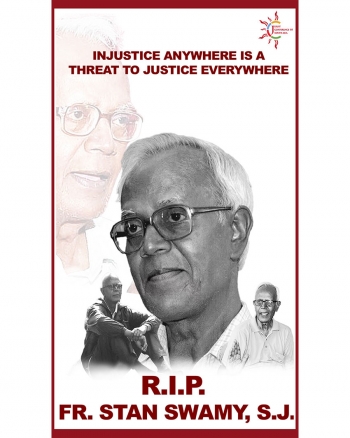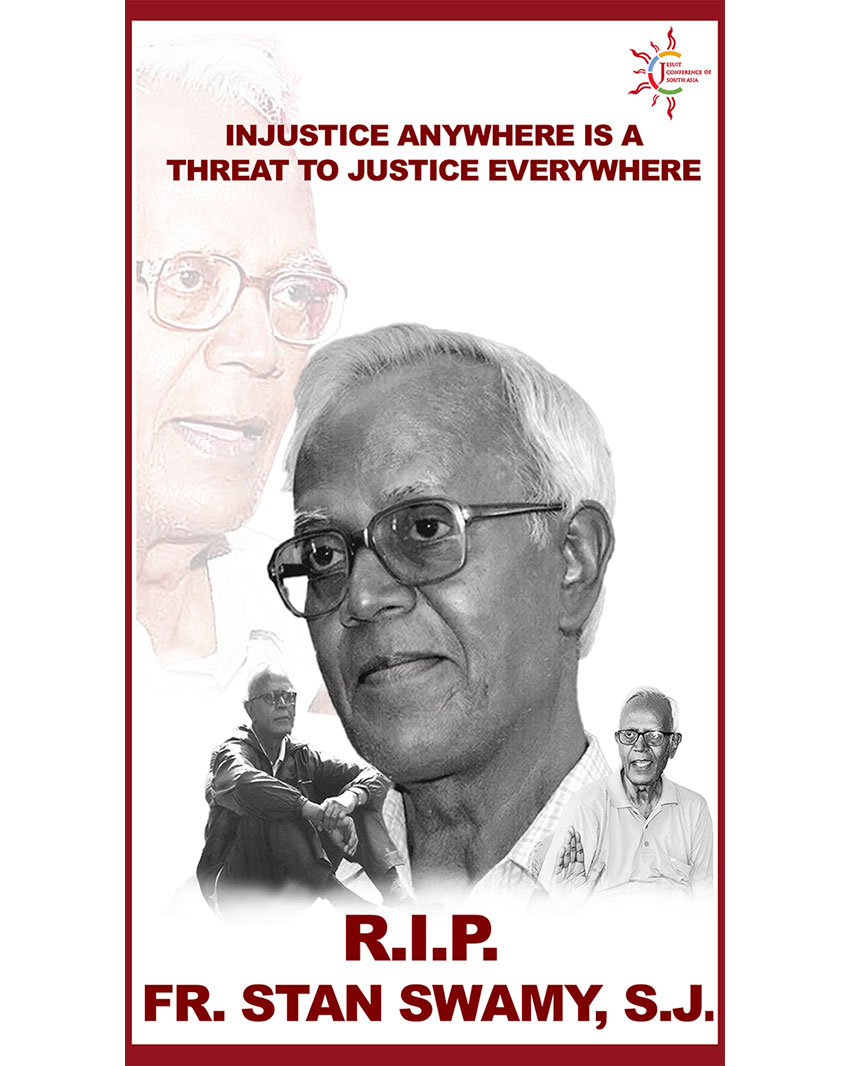
.png) Joseph Maliakan
Joseph Maliakan

Months before he died in custody, 84-year-old Jesuit priest Stan Swamy, who fought for the rights of the Adivasis, had written his own epitaph: “In the current system, justice is beyond the means of those who have been falsely accused.”
Nine months ago, in October 2020, when he was arrested by the National Investigation Agency (NIA) though he was suffering from different ailments including Parkinsons, he could carry out essential chores like eating, drinking and bathing on his own. But within weeks of imprisonment, living in inhuman conditions, his health deteriorated fast and in spite of repeated pleadings before various courts he did not receive proper medical care on time.
Even a very casual examination of the life and activities of Fr. Stan and the actions of Jharkhand police when the BJP-led government ruled the state and the National Investigation Agency (NIA) will reveal that they were hell bent on fixing him by hook or crook.
Though Fr Stan started as an academician, being the Director of Indian Social Institute, Bangaluru, his heart was always with the Dalits and marginalized people. This brought him to Jharkhand to work amid Adivasis. In the late 1980s he became the Director of Jharkhandi Organisation for Human Rights Centre, popularly known as JOHAR, a word of greeting among Adivasis. In the 12 years he headed the organization, Fr. Stan became part of the life and struggle of the Adivasis.
In the 1990s as India opened its economy a number of multinational companies eyed the mineral rich Adivasi lands. In the name of development their lands were illegally taken over, displacing thousands of Adivasis. Fr Stan not only supported their struggle but actively participated in their protest activities.
“Every mine that is dug not only destroys the green forests, fertile lands and water bodies but also displaces entire village habitations,” Fr. Stan pointed out in support of the Adivasis. In 2006, after the formation of Jharkhand, he set up Bagaicha in Ranchi which was primarily meant for training, research and advocacy, focusing on identity, dignity, justice and empowerment of the Adivasis.
Panchayats (Extension in Scheduled Areas) Act 1996 (PESA) empowers gramsabhas to take responsibility for development of villages. Fr. Stan criticized successive Jharkhand governments about the non-implementation of the provisions of PESA which adversely affected the lives of the Adivasis. Jal, Jungle and Jameen belonged to the Adivasis, he staunchly believed.
Consequently, he actively participated in the Adivasis’ struggle against the Netrahat Field Firing Project and the Koel Karo dam project that were to displace thousands of them. He wrote extensively against these projects in newspapers.
Now we come to the most grievous crime Fr. Stan allegedly committed. During 2014-15 the Jharkhand Government indiscriminately arrested thousands of Adivasis, especially youths. He convened a meeting of people of goodwill to discuss the nature of the intervention required to rescue the youths from incarceration. There was very good response, especially from the legal community. Sudha Bharadwaj who has been arrested by the NIA and has been charged under various sections of the draconian Unlawful Activities Act,1967 (UAPA ) also took part in the discussions.
The discussions led to the setting up of a forum named Persecuted Prisoners Solidarity Committee (PPSC) to approach the courts on behalf of the Under Trial Prisoners (UTPs). Thereafter, based on the available data on the arrested Dalit and Adivasi youths, Fr. Stan filed a petition under public interest litigation (PIL) in the Jharkhand High Court. The Court on the basis of the evidence provided in the petition directed the government of Jharkhand to furnish complete information about under trial prisoners in the state. Shockingly, the state is yet to submit its report!
However, to teach Fr. Stan a lesson in good behavior, the Jharkhand Administration registered a criminal case against him on the basis of a Facebook comment he made on the Pathalgadi movement. Pathals are stones erected at village entrances according to age-old Adivasi custom. Adivasi villagers in Khunti district inscribed on the pathals various rights guaranteed to them by the Constitution of India and the PESA. The government labeled all those who supported the Pathalgadi movement as anti-nationals.
An FIR was registered against Stan and 19 others for supporting the Pathalgadi movement in 2018. A year after the FIR was registered, a Khunti court declared Fr Stan a ‘proclaimed absconder’ under section 82 of the Criminal Procedure Code and ordered attachment of his properties. At that time he was away in Bangaluru for medical treatment. In October 2019, the police took away two tables, a steel shelf, three plastic chairs, a mattress and a pillow from his room.
Fr. Stan challenged the allegations in the High Court where the prosecution described him as a “dreaded criminal.” The High Court on December 6, 2019 declared that proper procedures were not followed in the cases against him and absolved him of all charges. At the end of December 2019, the new Jharkhand government headed by Hemant Soren decided to withdraw all cases related to the Pathalgadi movement.
But the Union Government for well-known reasons wanted to fix Fr Stan and other civil and human right champions in the country and implicated them in the Bhima-Koregaon conspiracy case. The government, police, courts, and media have become collaborators in the ‘great design’ to develop the nation by depriving the Adivasis and Dalits of their Jal, Jungle and Jameen.